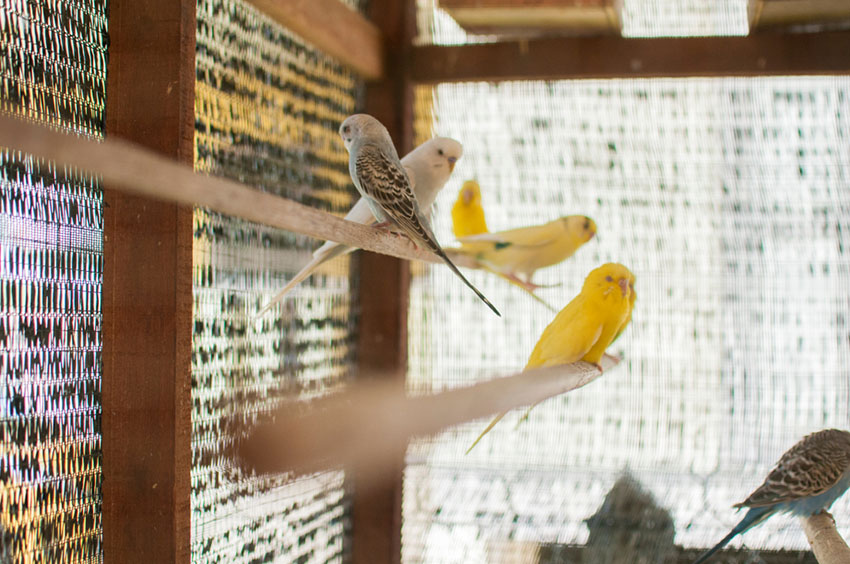In the wild, parakeets live in flocks, so they love company. There are still ‘pecking order’ issues, though, and a new member will be challenged, to make sure they ‘know their place’.
New birds also need a period of quarantine, to make sure they’re healthy. Keep new birds away from the other(s) for four weeks, in a separate cage. After the first week, if there are no health issues, move the cage close to the other birds, to get the birds used to each other.
The first physical contact the birds make without bars between them should take place in the cage the birds are going to live in together. If this is the established bird’s territory, having a good clean out and swapping the cage fittings around will make it a relatively neutral space. Put food stations on opposite sides of the cage, so that the parakeets can feed separately if they want to.

Parakeets love each other’s company
There may be a few bickering or squawking sessions, but that’s natural. Things will usually calm down quickly once the pecking order has been well and truly pecked into place. You can intervene by offering millet – no parakeet can resist.
Very occasionally, two birds will fight, regardless of the millet, and you may have to keep them apart longer and try again in a week or so. The larger the cage, the easier the transition.
Keeping Parakeets in Pairs
As a general rule, a pair of parakeets will be happier than a single bird. All your bird needs is a companion – which means another bird, or you - and it will be content.
If you only keep one bird, you will need to be its friend and companion. This means spending lots of time with the parakeet every day.
How Many Parakeets Can Fit in One Cage?
To find out how many birds you can accommodate, you will need to work out the cubic capacity of your cage. This is the height x the length x the width, so that a cage measuring 35 inches (90cm) in all dimensions will be 42,875 cubic inches (729,000cm3). Each parakeet requires 4,000 cubic inches (65,000cm3), so in a cage of these dimensions you could fit 10 birds. Note: this is the maximum number, and you should always provide as much space as you can.
If you keep your parakeets with other species of bird (see the sections below), the calculations will have to be tweaked accordingly. Birds of similar size to parakeets need the same space as a parakeet, while larger birds such as cockatiels will need three times the cubic space of a parakeet.
Keeping Male Parakeets Together
If your birds are both male, there will be occasional outbursts of bickering. It’s important to realise that bringing a parakeet home means bringing noise into the household. This is usually musical and gentle on the ear; but a couple of males in the mating season can create quite a noise between them.

Male parakeets live together happily most of the time
If you’re very unlucky, one of the parakeets may end up being bullied, and his health will suffer. Sometimes the only option is to put either the bully or the victim in a separate cage. This dilemma is very uncommon, though.
Keeping Male and Female Parakeets Together
If you’re limiting yourself to two pet parakeets, a cock and a hen will get on very well. Of course, at some point their thoughts will turn to nests and eggs, but you can discourage them by making sure there are no potential nesting holes in the cage (i.e. anything in the cage with a hollow, including coconut shells or other toys that could be adapted into nests). If the tools are not available, two (or more) birds can live happily and celibately together.
Neutering your parakeets is not a good option – the birds often die after the operation.
Keeping Female Parakeets Together
There’s been some nonsense written over the years about hen parakeets being more aggressive and noisier than males. Most of it is sexist nonsense, though. Hens cohabit perfectly well most of the time, and actually squabble less than males, usually.

Hen parakeets love each other’s company
The later addition of a male in a cage containing two hens will upset the balance. There is probably not a species in the animal kingdom that would fail to fall out in those circumstances! Three is often a crowd, especially in the mating season. The same principle applies to two males and a single female. Three females? No problem.
Keeping Parakeets With Other Birds
Parakeets will mix happily with other small birds, including their fellow Australians the cockatiels (Nymphicus hollandicus), and many other small parrots and lorikeets. Zebra finches (Taeniopygia guttata) - also Australians - generally get along with parakeets too.
Popular pet birds that should not be kept with budgerigars include any parrot larger than a cockatiel; love birds (family Agapornis), whose love is reserved for each other; the Common Mynah bird (Acridotheres tristis) ; and (unless you have a huge aviary) canaries (Serinus canaria domestica).

Parakeets and cockatiels usually get along just fine, given plenty of space
Another important detail in a mixed aviary is food. All birds have different dietary requirements, and all the occupants of your aviary will need to fed properly. Keep on eye on things, and make sure the cockatiels (for example) are not eating the lot!
The nightmare scenario is when a skittish parakeet lives with an intimidating larger bird. In these circumstances you will need to step in and rescue the victim from the bully.
Keeping Parakeets and Finches Together
Parakeets and Zebra finches usually get on well in an aviary, as long as there’s lots of space. If the ‘keets feel crowded, they may take it out on the finches.

Parakeets and Zebra finches make happy cage-mates
Keeping Parakeets and Canaries Together
If you have a very big aviary, you can mix these birds; but in more confined quarters, and in general, parakeets bully canaries. The latter are fragile little things, and can easily be killed by the stronger bird.
Keeping Parakeets and Quail Together
If the birds are being kept in an outdoor aviary or birdhouse, parakeets and quail can share a space with no problem. The Chinese painted quail, aka Button quail or King quail (Coturnix chinensii), and the Japanese quail (Coturnix japonica) are common types of pet quail. They inhabit the ground space, in a kind of parallel world to the parakeet activity going on in the higher parts of the cage.
Keeping Parakeets and Doves Together
The small doves or pigeons available in the pet trade are gentle and passive birds, and the main consideration is whether they are going to be bullied by other birds. There are stories of doves - and indeed quail - being attacked by aggressive parakeets. Other owners say they have never had any problem mixing the birds. The key thing is to keep a parakeet who has suddenly turned territorial or sexually aggressive in the breeding season away from the doves. The mix is only ever going to work if you have a BIG cage. In fact, if you consider your bird enclosure to be a cage rather than an aviary, it's probably too small.

A parakeet on a crested pigeon - not an ideal situation, as even a friendly parakeet has a very sharp beak
In most cases, the birds will keep themselves to themselves. Keep an eye on things, though, as a parakeet's beak is a sharp weapon, even in play. The commonest dove species found in pet stores are the Diamond dove (Geopelia cuneata) and The Crested pigeon (Ocyphaps lophotes), and the Ring-necked dove (Streptopelia Risoria), and all are suitable for large, mixed aviaries where the dove is the largest bird in the enclosure.
Keeping Parakeets in Separate Cages
Parakeets need to be kept apart if one of them is being bullied. Mating birds will need their own space too.
If you are introducing a new bird to an existing set up, settling it in with a separate cage is best. Place it close to the established birds so that they can all get used to each other. This is particularly important if your addition is a young bird, as he will be very nervous to begin with, and easily bullied.
Keeping Parakeets Warm in Winter
Parakeets are from Australia, so they’re used to the heat. On the other hand, they do not like the cold. Indoor birds should not be kept in a cold, unheated room during the winter. Anything below 46F will feel chilly to them. In general, if the ambient temperature is comfortable for you, it will be comfortable for your parakeet.
A cold parakeet will fluff out its feathers and sit quietly. If you live in a cold place, a cover over the cage at night will help retain heat. If things are really cold, you’ll need to heat the room or the aviary. In the winter you’ll need to check the water too, to make sure it hasn’t frozen.

Parakeets are happy outdoors, as long as they're warm enough
An open fire to heat an indoor room isn’t hazardous to parakeets, (as long as all the smoke is going up the chimney). If this is the only source of heat, however, the room will soon cool down during the night; so, again, make sure the room is kept as cosy as possible.




Comments
Jean, 13 February 2023
How can you tell the sex of a parakeet and bungee I bought all three birds from owners and they didn’t know
Jeff, 30 January 2023
Bought two parakeets (turned out both female) in 2015-ish and pet store thought they were older. Anyhow, the two seemed to get along okay there was one Alpha female and after a few years the non alpha died naturally Im assuming in 2021? The one has been by herself since. Should I get another to keep her company? The cage is 30" L x 18" w x 16" t...they have rarely been out even though I tend to leave the door open 24/7. Im by the cage most of the day but they were never use to being handled. Thoughts? Jeff
Gabby, 13 June 2022
my birds keep fighting what shall i do!!!!!!!!?????????
Joseph, 12 May 2021
I already have one Budgie in my Geo cage...can I get a Zebra Finch for company?
Dorothy, 2 May 2021
Can the geo cage accommodate 3 finches?